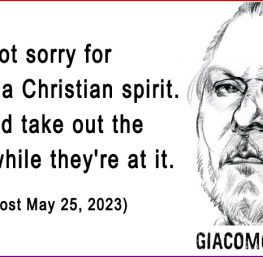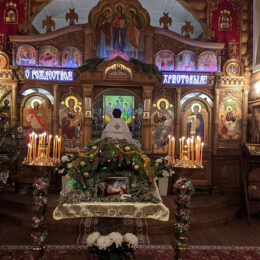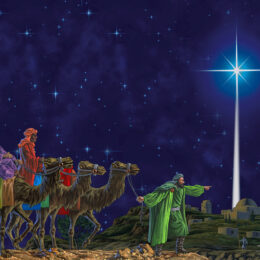http://www.kosovo.com
Belgrade, Jan 4 (Dec 22, Julian Calendar): His Holiness Patriarch Pavle has read the Nativity Epistle to the representatives of the media in the Patriarchal Palace in Belgrade. The text of the Epistle follows:
Serbian Orthodox Church to her spiritual children at Christmas, 2004
+PAVLE
By the Grace of God
For today the Only begotten Son of God is born,
the radiance of His glory,
the Image of His very being and everlastingness.
St. John Damascene, Homily on the Holy Nativity of Christ
This is the day which the Old Testament prophets awaited (Is. 2:2-3; 9,6; Jer. 23:5-6; Ez. 34:23; Micah 5:2); this is the day for which the righteous of the Old Testament yearned (Gen. 12:3; Deut. 18:5); this is the day which has been promised to all who seek the Lord (Ps. 118:24), “for being by nature perfect God, He becomes by nature perfect Man – He is the same, not changing natures, nor undergoing an illusory incarnation” says St. John of Damascus.
Dear Christ-loving brothers and sisters, our dear spiritual children, today the Son of God who becomes the Son of Man is born unto us, remaining miraculously both God and man. Today, through the power and operation of the Holy Spirit, the Savior of the world, the King of Israel, the Son of David, is born of the Virgin, the Holy Theotokos (Mt. 15:22). For this reason we sing, together with St. Gregory the Theologian: “O new combination! O miraculous unity! He who Is becomes and the Uncreated is created.”
We have repeated a number of times that the Lord is born today, and it is truly thus. The greatness of our feasts is in the fact that the events are miraculously made present and real to us once again. This becomes all the more clear to us if we understand the biblical notion of remembrance, which always understands that the event remembered is in fact made present for us. This world and the time in which we live has almost no grasp of this truth. It is for this reason that people experience this and other feasts as simply being a remembrance of an event which occurred sometime and someplace long ago, as something which is nice to remember, for, as it is usually said, these our are our nice, old traditions. However, the feasts are ‘traditions’ only in the least significant sense of the word. Firstly, they fill our lives with meaning, a sense of existence, consecrating the time in which we live. Christians who know that Christ has come, who realize that He is present in our homes and at the Divine Liturgy, and who await His Second Coming, have a completely different attitude towards life, its meaning and its values, as opposed to those who do not think this way and who seek some kind of meaning only from the world around them.
Today’s Feast reveals to us that we are not called to simply be good, honorable, noble and model citizens, but far more than this: we are called to become the children of God; to care for the world around us and to offer it to God that it might eternally exist. Isn’t this the solution to our ecological crisis? Isn’t our return to a biblical, Christian view of the world the solution to not only this but all of our other problems? It truly is for those who have ears to hear and eyes to see.
The Holy Bible, that book of life, speaks clearly to us regarding all of these matters. The world and mankind were created by God from nothing (Gen. 1:1). In and of themselves they have nothing that would keep them in existence without God. It is in unity with God that our existence, our life, is made possible. God offers us that life, although He does not force us to accept it. Having created us in His image (Gen. 1:26), He gave us free will that in love we might use that freedom in accepting His call. Adam and Eve, unfortuantely, used their freedom negatively and did not accept God’s invitation (Gen. 3:6); but the Lord God did not abandon them, just as He does not abandon us (Gen. 3:15). Rather, He continued to provide for man and to prepare him for the coming of the Messiah who would save both man and the world (Jer. 31:31-33).
In a ridiculing tone contemporary man asks, ‘How will He save it?’ Our answer is that God will save it by becoming man, while at the same time preserving His divine nature. That is exactly what happens on this day: God becomes man. Today salvation appears in the world.
‘From what does the Lord save us,’ contemporary man continues to inquire. This is truly difficult to explain. It is difficult to speak of this need to one who fails to see a reason to be saved. Only a man with a hardened heart isn’t horrified at seeing all the tribulations, agony and sufferings which fill this world. How many tears have been shed just in our lands throughout history? Was not this year a celebration of the 200th anniversary of the First Serbian Uprising and of our freeing from centuries of slavery, remembering our holy and glorious ancestors who demonstrated that love of which there is no greater, “that a man lay down his life for his neighbors” (Jn. 15:13)? As descendents of these great people who were filled with love for Christ and their brothers and sisters, we remembered them and those storied days with hearts overflowing with joy. Unfotunately. these past two hundred years have been filled with so many wars, killings, crimes and all sorts of injustices and degradations. How many children were left without their parents, how many parents without their children, how many tears shed for lost homelands, for the waters that first quenched our thirst and for air which we first breathed? And need we continue to number all the misfortunes in this vale of tears, as Fr. Justin Popovic calls this world? The peace of God, which this day brings, was longed for by our people more than bread.
For this reason let us rejoice at the salvation we are given today, but let us rejoice in this gift at the place where it is given, which is the Church. The miraculous and mystical reality of the Feast is not fulfilled at every place, even though it offers salvation to every place. This reality of the Feast is fully experienced only in the Church, at the holy Gathering of the faithful, at the Divine Liturgy. This is where Christmas is celebrated, where we receive the gifts of the feast in the Holy Eucharist, where we are united with God who became man. “This is why we celebrate, not theatrically, but divinely; not in a wordly way, but beyond this world; we celebrate not our feast but the Lord’s Feast, not sickness but healing, not creation but re-creation” (St. Gregory the Theologian).
However, our salvation is not complete today. Today begins its realization. According to the words of St. Gregory the Theologian, “Since we fell from our goodness by following evil, we need the Lord to restore us by becoming incarnate.” Yet not even the incarnation is sufficient in and of itself – the suffering of the Cross and the glorious resurrection were also necessary (Jn. 12:27), and all of this our Lord does for our salvation. This is why St. John Chrysostom exlaims, “O new miracle! O unutterable grace! Christ battles, but I receive the wreath. He fights against the devil, but I carry away the victory over the devil.”
Unfortunately, even though we receive all of these Gifts at the Divine Liturgy, there are many who, even today, do not come to the holy churches. However it is not ours to judge, but rather to pray that the Lord brings them to salvation as well. We need to remember that we must not destroy anyone’s freedom. Everyone has the right not to see that the source and meaning of their lives is found in unity with God. The Lord does not abandon even them, but gives them the right to live and time to repent and change their perilous decisions. We pray that they too might learn from the wise men who had worshipped the stars, but when they saw the Lord – they worshipped Him, for He came to free them from their slavery to the stars and from their belief in blind fate (St. Bishop Nicholai).
While freedom is being proclaimed throughout the world, our brothers and sisters in Kosovo are being stripped of even their right to life. The words of our Lord are being fulfilled in them when He says that even the birds and the animals have homes but they, just like the Son of Man, do not have a place to lay their heads (Mat. 8:22). In the lands of crucified Kosovo and Metohija the homes of our brethren have been destroyed and burned, centuries-old churches have been demolished, graves have been dug up. They have no right to live in the very land which was paid for with our blood.
It is to them first of all that we direct the words that Christ gave to His followers: “Fear not little flock…” (Luke 12:32). To survive and remain today in Kosovo and Metohija is possible only with the Lord’s help. Therefore, may the Lord fill them with unutterable joy. On this day we do not wish to name those who are guilty for this state of affairs, but rather we pray that the light of today’s Feast may shine upon them as well, so that they may realize the greatness of their committed sin, not just against our brethren, but upon themselves and their descendents. May the Lord forgive them for they know not what they do, and we forgive by the love of Christ, for it is only by being filled with love that we might comprehend the greatness of this day – the Feast of peace. It is only with this kind of love that we can rejoice with the shephards of Bethlehem and sing with the angels of peace: “Glory to God in the highest and on earth peace, good will toward men” (Luke 2:14).
The love of Christ, which has illuminated us today, invites us to extend this same love to others. We speak of the love which is the essence of God’s very existence, and all of us, in order to become godlike, are called to have this same kind of love.
In the name of this love, we call upon our brethren in the Republic of Macedonia, who are in a schism, to turn to the Newborn Christ Child, that in unity we may rejoice, for He came that we all might be one, as the Lord says, “That they all may be one, as You, Father, are in Me, and I in You; that they also may be one in Us, that the world may believe that You sent Me” (Jn. 17:21).
For the sake of this salvific unity we call upon all of our Orthodox brothers and sisters in Montenegro, that in brotherly love they may gather around the cradle of the Newborn Christ, for, ragardless of the differences in their tribal or nationalistic claims, they are brothers and sisters by God and their common ancestors. And we pass on to them that we are saved not through nationality nor by political parties, but through the Holy Church, whose exalted service of peace and salvation is being accomplished by the Metropolinate of Montenegro and the Coastlands and the other dioceses of Montenegro. For this reason we pray to God that He will pour out His peace and this Festal joy on all of those who live in peace, love and faith.
We especially turn to our spiritual children living in the diaspora, as well as those in the homeland, who live in diverse environments, that they may deal with everyone not only with understanding, since for a Christian this is insufficient, but with love. We are not called to simply tolerate our neighbor but to love them, according to our Lord’s words: “And if you greet your brethren only, what do you do more than the others? Do not even the tax collectors do so?” (Matt. 5:37). Let no one be offended, much less wounded, because of our name or our deeds. This is what our heart desires, what we pray to God for and what we call all of you, our spiritual children, to do.
We call on the love and wisdom of those who occupy the most responsible positions in our country, all those who influence the preservation of the values of our country and the establishing of the laws on which the state is founded as one nation and many nationalities, that they not forget that this is a Christian country, that they not be ashamed of their name and ancestry, and that they not cause our ancestors to be ashamed of us when we come before them. In calling upon them to be aware that this is a Christian country, we seek no royal rights, rather, we seek that truth not be called lies, nor that lies be proclaimed the truth, nor that immorality be proclaimed morality.
Of those most responsible for the education of our children and for creating the conditions to bring them to maturity, we seek that they not discount the Biblical truths and the goal which is set before us human beings, which is that we should become God by the grace of God. The Apostle Paul clearly states, “All things are lawful for me, but all things are not helpful. All things are lawful for me, but I will not be brought under the power of any” (I Cor. 6:12).
We call upon our spiritual daughters that they bear children and not kill the unborn in their wombs, using as an excuse “family planning.” Let no one use poverty to justify themselves. Children have a need for many things, but above all else they need love and harmony in the family. Love does not depend on money; in fact, it is often the case that where there is more money there is less love. Society and the family today are in great need of love and peace. The reforms which were spoken of and of which we speak today have their good sides. However, if we do not experience a transfiguration in our lives, if we do not set Christ-like love as the foundation of our life, then all of our efforts and work will be in vain, as the Apostle Paul says, “Though I speak with the tongue of men and angels, but have not love, I have become sounding brass or a clanging cymbal” (I. Cor. 13:1).
In celebrating Christ’s Nativity, by which mankind is exalted, we joyously exclaim with the shepards, we sing with the angels, we worship with the Wise Men the Newborn God, and we offer our thanksgiving to the Christ Child who descended from the heavens that He might carry us into the Heavenly Kingdom.
We pray to the Newborn Christ Child that in the coming year there may be less turmoil and more peace, less hatred and more love, less dismay and more unity and every blessing from God. On you, our dear spiritual children, we evoke God’s blessings that in peace and love for God and your neighbors you might celebrate the coming of the Newborn Christ Child, greeting one another with the joyous Christmas greeting:
PEACE FROM GOD – CHRIST IS BORN!
INDEED HE IS BORN!
Given at the Serbian Patriarchate in Belgrade, at Christmas, 2004.




Patriarch Pavle is certainly one of the great spiritual leaders of Othodoxy today. It was the Patriarch’s moral authority, more than Clinton’s military action, that helped bring down the despotic and genocidal Milosovich regime. Patriarch Pavle was truly horrified by the actions of Milosovich’s paramilitaries in Kosovo and condemned them in no uncertain terms. Patriarch Pavle’s call in 1999 for Milosovich to resign turned the tide of Serbian public opinion, leading to the dicatators removal and the installation of a new more democratic government in Belgrade.
“World: Europe; Serbia’s church: Changing times” http://news.bbc.co.uk/1/hi/world/europe/380268.stm